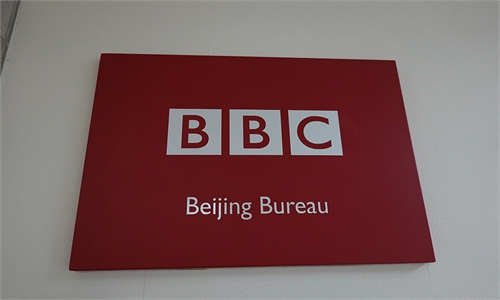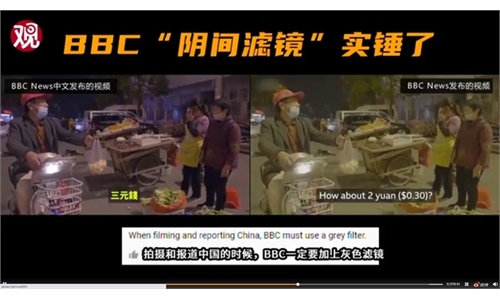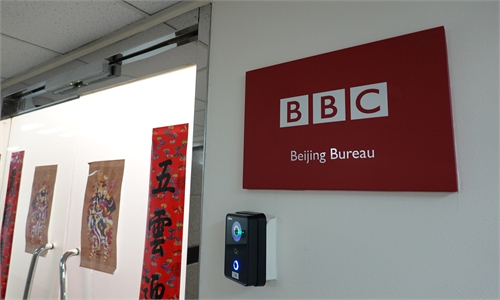IN-DEPTH / IN-DEPTH
BBC mocked in China for misleading reports, deceitful editing tricks
Biased Broadcasting Corporation
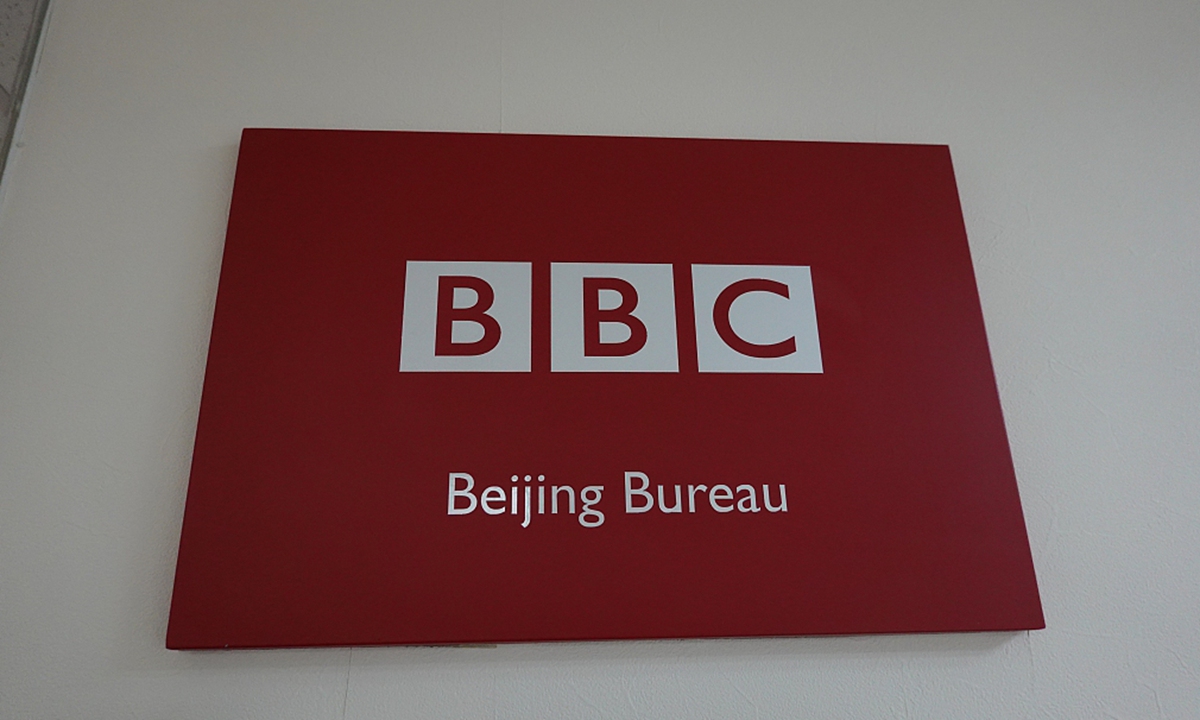
BBC Beijing Bureau Photo: VCG
BBC dramas, such as Sherlock, Merlin and Doctor Who, are widely known in China for its whimsical plot. But it may be the BBC journalists who are more imaginative than BBC screenwriter Steven Moffat.
A BBC video depicting the recovery of Wuhan, Central China's Hubei Province, from the COVID-19 outbreak has drawn the ire of Chinese netizens for the addition of a grayish filter in its English version, turning scenes of vivid colors into a seeming "bleak underworld."
It soon drew a backlash among the public, with many questioning the BBC's intention in using such a trick. The topic "BBC using an underworld filter" trended on China's Twitter-like Sina Weibo in recent days. Some said that the depressing filter made the video look like a horror movie, while others pointed out that this is how double standards work in the West.
Apart from the manipulating viewers' opinion through the language of the camera, BBC deviated from journalistic standards by releasing biased and rumormongering reports on Xinjiang, accusing the region of "mass rape" based on one-sided and unverified claims.
The BBC World News was thus barred from airing in China, the National Radio and Television Administration (NRTA) announced, saying some of the BBC's reports on China infringed the principles of truthfulness and impartiality in journalism.
The Chinese Ministry of Foreign Affairs said on Thursday that China's barring BBC World News is justified, reasonable and lawful in response to UK's revoking the license of Chinese news network CGTN, which was outrageous and unreasonable.
Foreign Ministry spokesperson Hua Chunying said that after investigation by China's National Radio and Television Administration (NRTA), the reports on China issues by BBC World News have seriously violated related regulations, violated the requirement that news should be true and fair, harmed China's national interests and undermined China's national unity, so the channel does not meet the conditions for foreign channels to air in China.
As people can see, BBC has repeatedly produced and reported fake news with a strong ideological bias against China, spreading false information on Hong Kong, Xinjiang and COVID-19 epidemic issues to attack and discredit China, Hua said.
Chinese observers said the BBC has turned into "a rumor mill" that deliberately throws mud at China, and the decision to suspend its broadcast sends a clear message that China doesn't accept fake news.
Suspending the broadcast of the BBC World News means that it cannot be received anywhere in the Chinese mainland, as China won't provide local resolution analysis service to the broadcast company anymore, said Wang Sixin, a professor of law at the Communication University of China.
He said that the high-profile announcement, on Chinese New Year's Eve, is to show China's attitude, and attract more public attention. "The BBC does not even bother to hide its anti-China rhetoric, commissioning an anti-China 'expert' for research and using fabricated materials to slander China. It deserves such punishment," said Wang.
China's Measures for the Administration of the Landing of Foreign Satellite Television Channels states that foreign satellite television channels approved for landing are prohibited to broadcast programs with content harming the national unity, sovereignty and territorial integrity of China.
It also notes that if foreign satellite television channels approved for landing violate the provisions of these Rules, where circumstances are grave, dissemination of specially designated content will be provisionally ceased, or the landing qualifications of the relevant channel will be provisionally suspended or cancelled.
Biased reporting
The BBC did not miss an opportunity to smear China when the British government used Hong Kong as an excuse to provoke China.
In the recent reports featuring British National (Overseas), or BN(O) passports, the BBC repeatedly emphasized Britain's status as a former colonial suzerain state for Hong Kong and tried to argue that Britain was entitled to interfere in Hong Kong's internal affairs under the banner of protecting so-called democracy and human rights.
It ramped up efforts to portray the people of Hong Kong being faced with a government "which did not listen to the people, and a police force that showed little restraint."
A week ago, the BBC produced a video report called "The exiles: Hong Kong at a crossroads." This seemingly ambitious piece was simply about two thugs who once carried the British flag during a demonstration in Hong Kong, moaning about their unexplained hatred of Chinese identity.
The BBC tried to report in an attempt to depict all Hong Kong people like the two rioters, masked even in the video, who might choose to escape legal punishment via the BN(O) policy.
The BBC's similar China-related reporting is not only ideologically biased but also often criticized for failing to follow the most fundamental journalistic norms. Netizens even question if some BBC journalists lost their most basic bottom line of honesty.
On China's Twitter-like platform Sina Weibo, a typical post comment reads "Not to be a man like CNN, not to make reports like BBC."
Other netizens wrote: "BBC is the abbreviation of 'babbling China', or even the 'Biased broadcasting corporation."
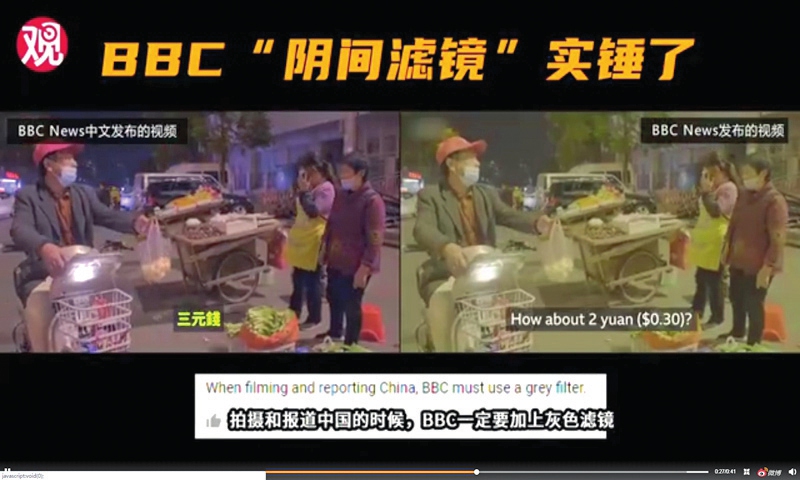
In its Chinese and English versions of the same video clip about Wuhan, BBC used different color filters, which could lead to different interpretations of the situation.
The lack of professionalism has often left some BBC journalists facing vigilance and rejection from the Chinese public who are disgusted by some of the discredited behavior of foreign media such as secretly filming, spreading rumors and posting unverified slanders.
The BBC recently put itself in the spotlight of the international community with a sensational story that accused China of "mass rape" in the Xinjiang Uygur Autonomous Region based on only one interviewee's unverified claim. The broadcaster also distorted coronavirus reports about Wuhan.
The BBC last week reported that Uygur women have been "systematically raped, sexually abused, and tortured" at Xinjiang's re-education camps, highlighting alleged abuses of women's rights in Xinjiang, which was seriously rejected for "having no factual basis" by Chinese Foreign Ministry Spokesperson Wang Wenbin, who urged the BBC to stop smearing China on Xinjiang topics.
When reporting the one-year anniversary of Wuhan's lockdown, the BBC used footage of police making arrest to claim that the lockdown was a violation of human rights. The footage turned out to be a highway epidemic control drill in Nanyang, Henan Province on February 21 last year, where a man tried to drive directly through a checkpoint and attacked police before being stopped.
China's Foreign Ministry made solemn representations last week to BBC's Beijing office for its reports that politicize and smear the epidemic work in China.
As the pandemic is the most wide-reaching global crisis in 2020, attacking China on this topic shows the sinister malignancy of the UK and US media, especially the BBC, Li Haidong, a professor at the Institute of International Relations at China Foreign Affairs University, told the Global Times on Friday.
Damaging consequences
The expert warned that biased reporting can create more conflict, which in turn could further hurt China-UK relations.
For quite some time, the BBC has been devoted to publicizing information that incites separatism and secessionism in China, which endangered China's national security, Shen Yi, a professor at the School of International Relations and Public Affairs of Fudan University, told the Global Times on Thursday.
Shen said that the broadcaster has yielded to serving the interests of illegal organizations that aim to tear China apart, and has long reported China from a preset stance. "Barring the airing of the BBC World News in China sends a clear message that China does not accept fake news," said Shen.
Li told the Global Times that it is possible that China will take further retaliatory measures, depending on whether the BBC will correct its wrongs, and stop distorting issues such as Hong Kong, Taiwan and Xinjiang. If not, China is likely to expel BBC journalists based in Chinese mainland, according to Li. "Expelling journalists is a reasonable move, because if journalists fail to report honestly, kicking them out is the right thing to do," said Li.
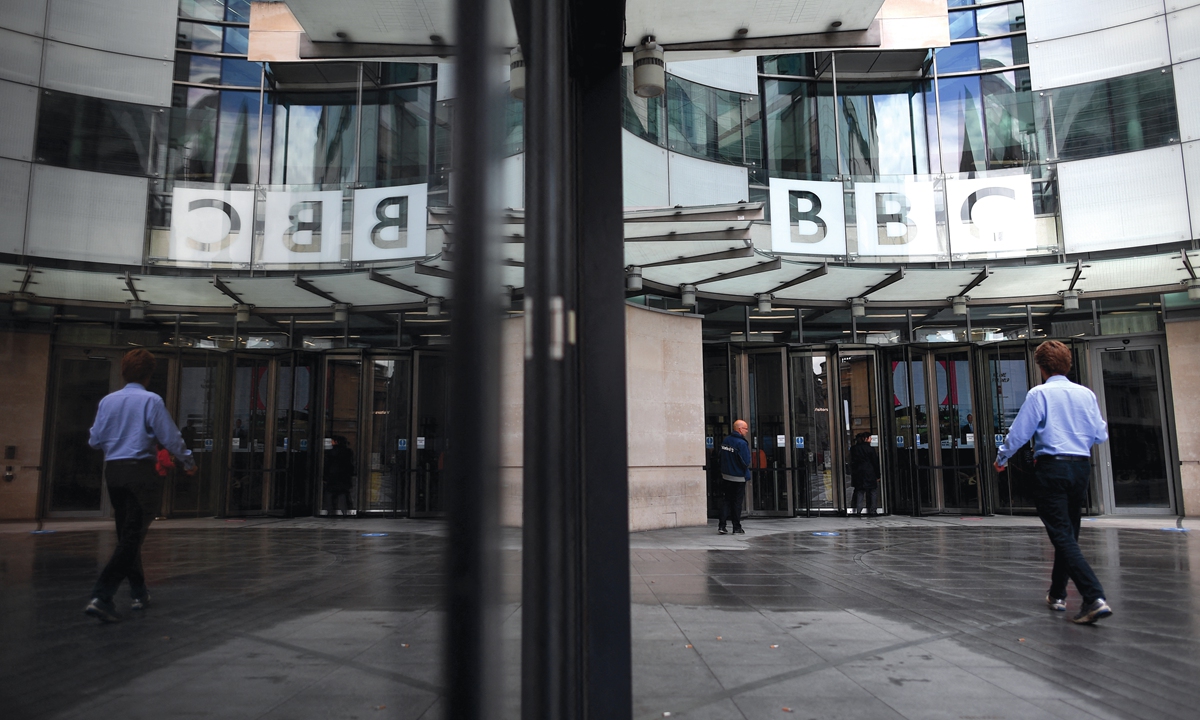
Outside the BBC headquarters in Portland Place, London Photo: AFP
Li said that the BBC's China reporting has brought huge damage to China-UK ties, especially its coverage on China's handling of COVID-19. "COVID-19 grabs universal attention, and is important and sensitive while the BBC keeps stirring anti-China sentiment on this matter. This will further stimulate Western governments to use antagonistic methods toward China. It is very dangerous," said Li.The UK has acted maliciously on a slew of issues related to China's domestic affairs, according to Li, noting that the BBC's recent act seems to help the UK shape its international image in the post-Brexit era.
The anti-China movement seems to be steadily gaining momentum in the UK, Martin Jacques, a former senior fellow at the Department of Politics and International Studies at Cambridge University, told the Global Times recently. He has compared the movement to a crusade, and media, including the BBC, have played an important part in this movement. "The crusade has mobilized around two issues in particular: Xinjiang and Hong Kong."
He said the anti-China movement has experienced a gathering process since 2016, and expects the situation to get worse. "Now that we (the UK) have left the EU, the UK will be more dependent on its relationship with the US. Looking back, the period 2014-2016, the so-called golden age, now seems a long time ago," said Jacques.
Li Baiyang, an expert from Wuhan University in Hubei Province, told the Global Times that BBC's distorted reporting on China is part of the "anti-China rhetoric war," launched by Western anti-China forces. "Media just serve as the pawn."
He said the anti-China rhetoric war was started by some people in the West, who fear that China's rapid growth will impact their political system and social thoughts. So they engage in a campaign to smear China with strong ideological prejudice.
Even established media such as BBC has deviated from the neutral and objective way of reporting in this trend, said Li, noting that their selection of topic is biased, and their choice of "witnesses" often comes from anti-China forces, and they have degraded from world's famous media to tools in the ideological struggle.
He also said that the BBC's fake news only receives support from other Western media outlets. However, third-world countries are afraid of and even averse to such reports. Thus, apart from Western media with sense of responsibility, media from third-world countries should also stand up together to oppose such a trend.
